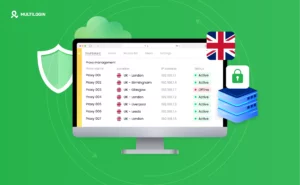Table of Contents
IP Reputation
IP reputation refers to the trustworthiness of an IP address based on its historical activity. Essentially, it’s a way for websites and online services to judge whether an IP has a history of being used for spam, fraud, or other malicious activities. The reputation of an IP can have a huge impact on its ability to access various online services. A “bad” IP reputation can lead to blocks, CAPTCHAs, or even being blacklisted, while a “good” reputation allows smoother, uninterrupted online interactions.
What Is IP Reputation?
IP reputation is a measure of how trusted or untrusted an IP address is. When an IP address is involved in spam emails, malicious activities, or high-volume bot traffic, its reputation suffers. Over time, services like email providers, websites, and even security software check the reputation of an IP to determine whether it’s safe to engage with. If an IP has been flagged for malicious behavior, it might be blocked from accessing certain websites or services.
How Does IP Reputation Work?
Positive Reputation
If an IP has a clean history, it will have a positive reputation. This typically means the IP has been associated with legitimate activity, like browsing or conducting business in a lawful way.
Negative Reputation
If an IP has been associated with spam, fraud, DDoS attacks, or other malicious activities, its reputation will be marked as poor. This makes it more likely to be blocked or flagged by websites and services.
IP Reputation and Antidetect Browsers
When choosing an antidetect browser, it’s crucial to consider the IP reputation associated with the IPs you’re using. Not all IP addresses are trustworthy—some may have been flagged due to past malicious activities, leading to issues like blocks or CAPTCHAs.
Multilogin helps by providing built-in residential proxies, which are tied to clean, trusted IPs. These IPs are less likely to be flagged or blocked, allowing you to carry out online tasks—such as web scraping or managing multiple accounts—without interruptions. So, when selecting an antidetect browser, it’s important to ensure you’re using reliable, high-quality IP addresses to avoid complications and maintain a seamless experience.
IP Reputation Check
An IP Reputation Check is a process where tools or services evaluate the trustworthiness of an IP address. This check can reveal if an IP has been blacklisted or flagged for suspicious behavior. By running an IP through a reputation checker, you can quickly see whether it’s considered “safe” for use. Tools often look at:
- The history of activity tied to the IP.
- Whether the IP is on any blacklists (e.g., Spamhaus or SORBS).
- The geographic location and IP ownership.
- DNS records and reverse DNS status.
Key Takeaways
- IP Reputation is important: The reputation of an IP address plays a critical role in online activities. A clean IP allows for smoother, uninterrupted access to websites, while a poor reputation can result in blocks or CAPTCHAs.
- Malicious Activity Affects Reputation: IPs linked to spam, fraud, or high-volume bot traffic tend to have negative reputations, making them more likely to be flagged by websites.
- Consider IP reputation choosing antidetect browsers: When using antidetect browsers, it’s essential to choose proxies tied to clean IPs. This reduces the risk of being blocked or detected during online activities. Multilogin offers built-in residential proxies with clean reputations, ensuring your IPs remain trustworthy
- Check IP Reputation: Regularly checking IP reputation helps ensure you’re using trustworthy IPs, which is key for smooth, undetected browsing with antidetect browsers.
People Also Ask
What is an IP reputation attack?
An IP reputation attack involves intentionally damaging the reputation of an IP address. This could be done through malicious activities like sending spam emails or launching DDoS attacks, which affect the IP’s standing. The goal is often to make the IP appear suspicious, causing it to be blocked or flagged by security services and possibly affecting legitimate users of that IP.
Why Is IP Reputation Important?
Your IP reputation can affect everything from accessing websites to email deliverability. A bad reputation could mean that emails sent from your IP end up in the spam folder or that your access to certain websites gets blocked. This is particularly important in online marketing, web scraping, or running multiple accounts where maintaining a good IP reputation is key to avoiding detection and disruption.
How Do I Check My IP Reputation?
You can check an IP’s reputation through services like Spamhaus, Cisco Talos, or AbuseIPDB. These platforms provide a reputation score based on historical behavior, blacklisting, and potential malicious activity.
How Do IP Reputation Attacks Work?
In an IP reputation attack, cybercriminals use various methods to damage an IP address’s reputation, including sending spam emails, engaging in DDoS attacks, or using botnets to flood websites with requests. The idea is to make the IP seem untrustworthy, which causes websites and services to block it.
How Can I Improve My IP Reputation?
To improve your IP reputation, make sure you follow good security practices. Avoid using the IP for any suspicious activities, implement spam filters, and use reputable services to monitor and maintain your IP’s standing. If your IP has been blacklisted, you may need to request removal from those blacklists after taking corrective actions.



